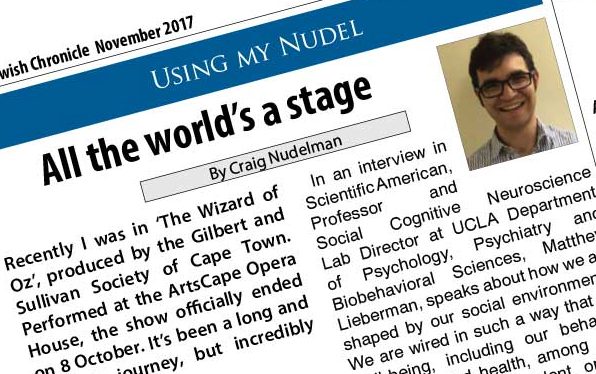By Craig Nudelman
Recently I was in ‘The Wizard of Oz’, produced by the Gilbert and Sullivan Society of Cape Town. Performed at the ArtsCape Opera House, the show officially ended on 8 October. It’s been a long and arduous journey, but incredibly fun and exciting.
Being a part of a performance and the process of getting a production onto stage is so complex, and is all about interaction and relationships. The actual live performance reveals how multifaceted these relationships are. First, there is the relationship between the whole cast and crew of the show — this includes the Director, Musical Director, Choreographer, Stage Manager (and assistant stage managers); the lighting team, the sound team, and many other ‘backstage people’. But what was so interesting to me, being a first-time performer, was the interaction between the ensemble (or the chorus), of which I was a member, the principals who play the lead roles, and the audience.
It’s like a love triangle: the ensemble feeds off the energy of the principals, who, in turn, feed off the energy of the ensemble. It’s a give and take relationship. If we were feeling down, they were down, and vice versa. Then there was the relationship between the performers and the audience. Our energy on stage was directly related to the energy emitted by the audience. These relationships all merged into the specific performance of that evening which gave each show its particular mood and flavour.
That’s the nature of a live show and it blew me away. I began to realise that these performances (in total there were 23), were just a microcosm of the world in which we live. Everything is related in some way or another. This concept of inter-connectedness is often spoken about in a spiritual, abstract way. However, there are many examples of how the smallest thing in the universe can change how we are what we are today.
In a TedX talk (which I highly recommend) Tom Chi, the Co-Founder of Google X and Founder of Prototype Thinking, explains that everything has a profound impact, from the most miniscule organism to the greatest invention in the world. He gives the example of one of the first organisms on earth, Cyanobacteria. Through the process of photosynthesis, these bacteria assisted in transforming the oxygen-poor atmosphere of the young earth and reduce the amount of carbon dioxide, helping to create a world in which life could exist. From the smallest of cells, the world was created.
In an interview in Scientific American, Professor and Social Cognitive Neuroscience Lab Director at UCLA Department of Psychology, Psychiatry and Biobehavioral Sciences, Matthew Lieberman, speaks about how we are shaped by our social environments. We are wired in such a way that our well-being, including our behavior, education, and health, among other things, are all dependent on our connection with others. He goes further, stating that phrases, such as ‘she broke my heart’ and ‘he hurt my feelings’, are more than metaphors. This demonstrates real social pain, which, he says, “is a sign that evolution has treated social connection like a necessity, not a luxury.”
To me, this shows how complex and amazing our human brains are. We are able subconsciously to tap into others’ deep emotions, thoughts and feelings in order to analyse situations. This reading of situations allows us to act not only for our own advantage, but in ways which benefit others as well.
In the world today, we are faced with many challenges. The acts of just a few men have created a negative atmosphere in the country and one single corrupt act can have a ripple effect on all society. Technology too, has the power to affect more people than ever before. Social media has allowed individuals to disseminate their thoughts and opinions, which can be both positive and negative: from the most benign of people on social media, to the most followed and powerful. For example, Donald Trump has a huge following on Twitter. His tweets have caused great waves in American and global affairs. And so, when he says that people should boycott watching the NFL because players are seen as being disrespectful to the national anthem, it has a large impact.
We must understand that our individual actions have a much greater impact than we may think. Our words and actions have meaning, and we must pass this information on to our children. I hope to tell this to my daughter, so that she learns to be empathetic and to watch what she does or says. And I must hope I’m not inadvertently transmitting any negative messages to her; ones that will negatively affect her self-esteem!
And so, in the future, remember that when you are a member in the audience, acknowledge that how you react can have a profound influence on the performance you are watching. In fact, it could even change the world!











